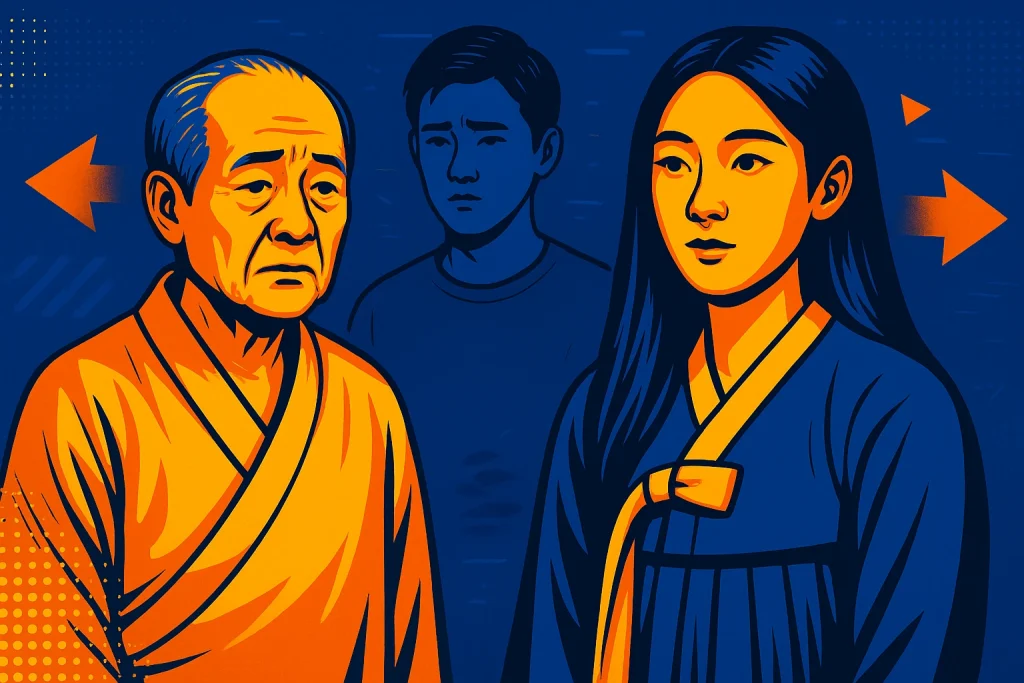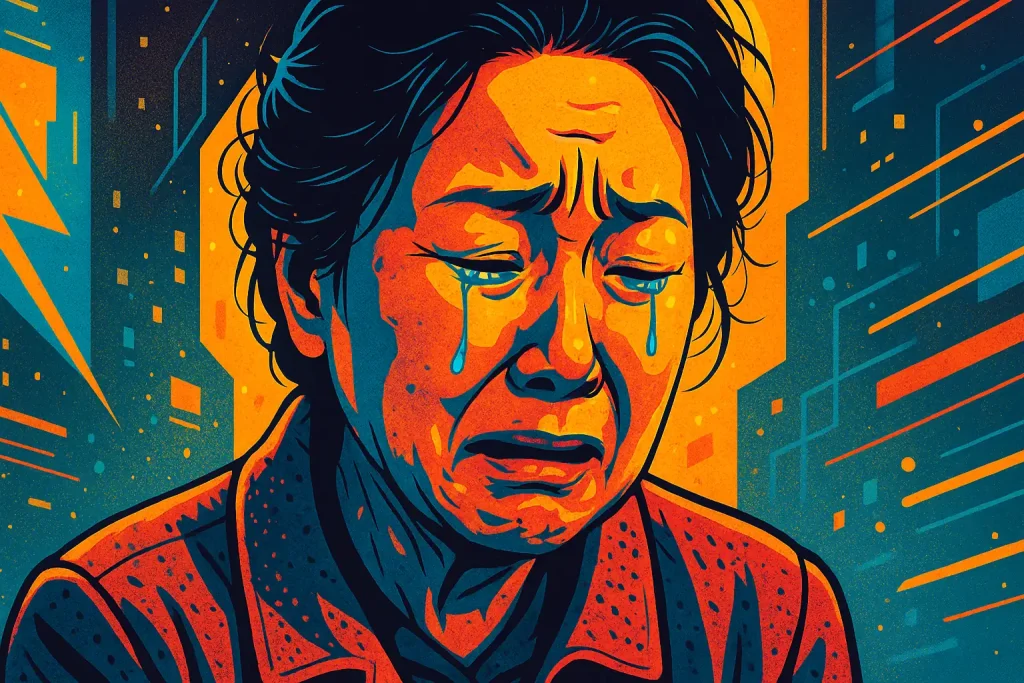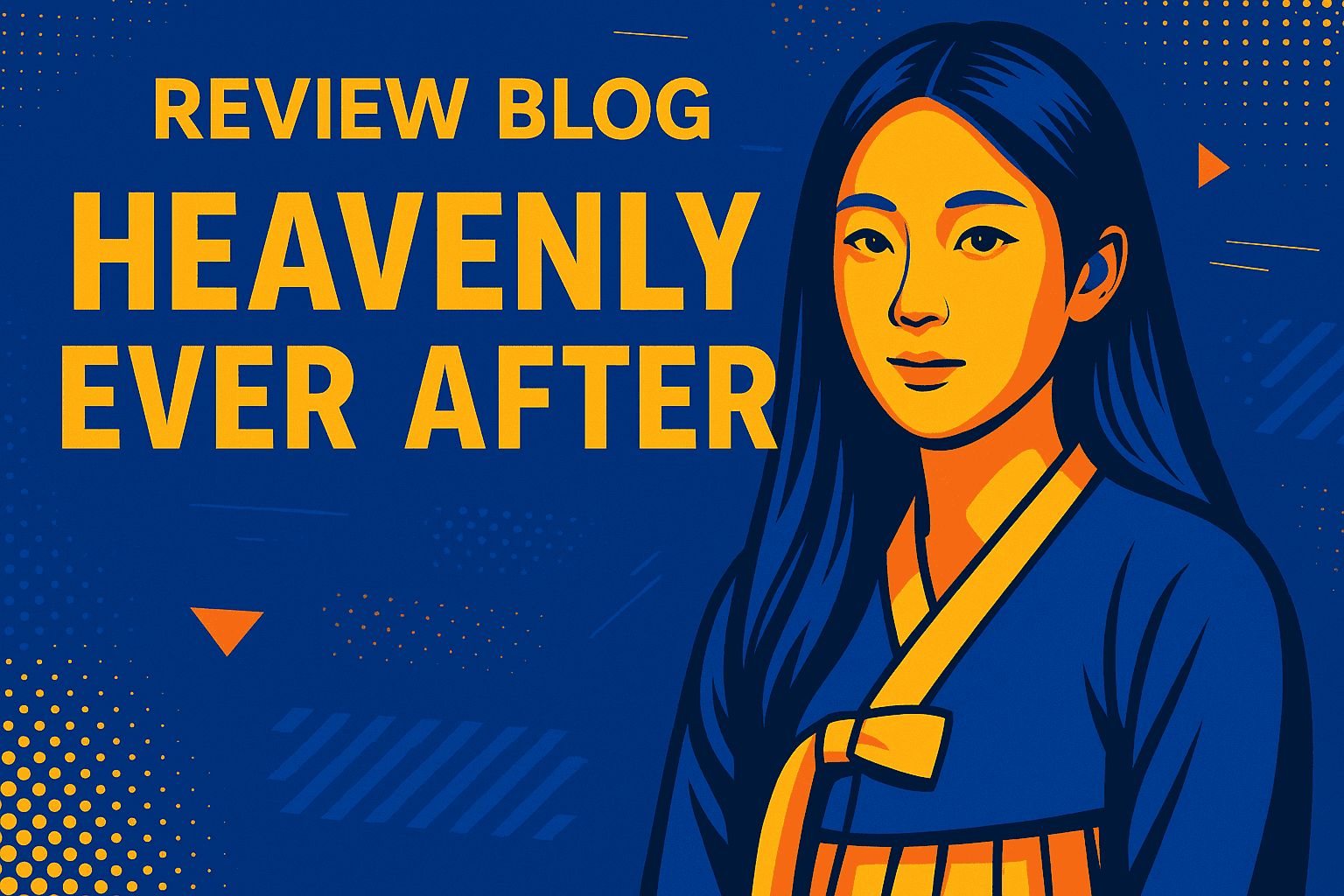Heavenly Ever After in Kdrama premiered in 2025 and has quickly become a talking point among romance-fantasy fans. In this Heavenly Ever After review, I’ll be examining what makes this show both beautiful and challenging. The series is significant because it uniquely blends fantasy with profound questions about aging, love, and identity. As more Kdramas push boundaries, Heavenly Ever After stands out for casting elderly characters in central roles, exploring the afterlife, and showcasing emotional depth rarely seen in mainstream fantasy romance.
I’m reviewing it because it offers more than just light romance—it challenges norms and expectations within the Kdrama space. This comprehensive review of Heavenly Ever After will unpack its narrative, performances, production, and emotional resonance. Whether you are drawn to the cast (Kim Hye-ja, Son Suk-ku, Han Ji-min), intrigued by its premise, or just searching for something heartfelt, this evaluation will help you understand what this show brings to the table and whether it deserves a spot on your must-watch list.
Overview
Heavenly Ever After is a romantic fantasy Kdrama written by Lee Nam-kyu and Kim Su-jin, directed by Kim Sok-yun. The story follows Lee Hae-sook, an 80-year-old woman who dies and enters Heaven. In the Heaven Admission Counseling Office, she chooses to retain her elderly appearance because her husband always said she was beautiful at all ages. Her husband, Ko Nak-joon, however, appears in Heaven as his 30-something self. Their dynamic—with Hae-sook remaining old and him young—creates both emotional conflicts and tender moments.
The series has 12 episodes and aired from April 19 to May 25, 2025, on JTBC, with streaming availability on Netflix in many regions. In addition to the romance and fantasy, Heavenly Ever After features strong supporting characters—such as Som-yi (a mysterious woman in Heaven), Lee Young-ae, and others—that deepen the emotional arcs. Overall, it mixes comedy, reflection, familial themes, and romance to deliver something both comforting and thought-provoking.
Pros and Cons

Pros
The strengths of Heavenly Ever After lie in its strong, experienced cast, led by Kim Hye-ja as Lee Hae-sook and Son Suk-ku as Nak-joon, who together deliver moving and layered performances enriched by the supporting actors. Its unique premise of choosing one’s appearance in the afterlife provides a fresh and thought-provoking take on fantasy-romance, standing apart from conventional K-dramas.
With high production values, the pacing of visuals, thoughtful design of Heaven, atmospheric soundtrack, and immersive fantasy world all contribute to its dreamy yet grounded charm. Themes such as aging, beauty, love, and self-acceptance are explored with sensitivity, inviting viewers to reflect deeply on what matters most beyond life.
Cons
Despite its strengths, the drama occasionally risks emotional overload, with some scenes slipping into sentimentality or melodrama, as noted by critics like South China Morning Post. The imbalance in character development becomes apparent as the leads are richly explored but supporting roles feel underused, leaving their arcs underdeveloped. Pacing issues arise in certain episodes, particularly during transitions between earthly pasts and heavenly presents, which sometimes reduce narrative momentum.
The rules of the fantasy world are not always clearly defined, with questions around age choice and afterlife mechanics occasionally creating moments of confusion. Finally, the visual and narrative tension caused by Nak-joon appearing much younger than Hae-sook adds dramatic weight but risks alienating viewers uncomfortable with the age-gap dynamic in a romantic setting.
In-Depth Analysis
Characterization & Acting
In terms of narrative begins with a high-concept idea: love transcending death, but complicated by appearance and age. The premise—maintaining one’s true age vs renewing youth in Heaven. The show balances past memories (earthly life) and present conflicts (in Heaven), letting the viewer feel both nostalgia and wonder. However, the backstory of why certain characters make their age/appearance choices sometimes feels under-explored.
Narrative & Premise
Lee Hae-sook, played by Kim Hye-ja, anchors the story. Her vulnerability, strength, and longing are felt throughout. Nak-joon, in his younger form, shows warmth and confusion — the emotional dissonance between love for his wife as she is and the shock of her choosing not to be young again. Supporting roles, such as Som-yi and Lee Young-ae, add layers—grief, companionship, regret—but occasionally some characters don’t get enough screen time to flesh out fully. The chemistry between leads helps carry some of the emotional weight, making many poignant scenes work.
Visuals, World-Building, & Setting
The production does well with its fantasy elements. Heaven is not cartoonish; it feels thoughtfully designed, soft in color palette but a place with rules and emotional rules. Scenes that shift between flashbacks and afterlife segments are handled with care. The show uses imagery of letters from Earth, longing, and memory in a way that ties the setting and visuals with emotion.
Themes & Symbolism
Age-ism, beauty, identity, love, regret, and the acceptance of self are core themes. The contrast between youth and age in appearance becomes symbolic of how society values youthful beauty—and of self-esteem. The series prompts reflection: what would we choose if we could pick our age forever? Acceptance of change, letting go of regret, honoring past selves — these are all central.
Structure & Pacing
While many episodes flow well, some feel padded; transitions between Heaven and Earth past could be tighter. Mid-season episodes especially are slower, which may reduce tension. The finale resolves many arcs, though some viewers might feel that certain mysteries or secondary arcs are rushed.
Overall, the show mostly succeeds: its emotional core is strong, its question about identity and love is meaningful, and despite a few narrative oddities, it delivers a satisfying fantasy romance.
Comparison

The comparison shows that Heavenly Ever After sets itself apart from other fantasy-romance K-dramas by boldly addressing aging and identity in the afterlife. While it shares the emotional depth and strong performances common in the genre, its focus on accepting one’s true self rather than chasing youth makes it a more unconventional and thought-provoking story.
| Aspect | Heavenly Ever After | Comparison with Other Fantasy-Romance K-dramas |
|---|---|---|
| Theme & Concept | Focuses on the afterlife, identity, and choice of age appearance. | The Light in Your Eyes (2019) uses time travel and youthful rebirth as its fantasy element. |
| Tone & Style | Whimsical, romantic, and reflective, centered on acceptance of identity. | Other afterlife Kdramas often use ghosts, reincarnation, or spiritual realms mainly as plot devices. |
| Unique Element | Lead character is 80 years old and chooses to stay her real age in Heaven. | Most Kdramas portray youth as the ideal, rarely exploring old age as a central theme. |
| Emotional Focus | Strong emphasis on love, regret, and family, with deep existential questions. | Aligns with emotional richness typical of fantasy-romance Kdramas, offering heartfelt storytelling. |
| Visual Symbolism | Explicit exploration of age contrast and its impact on love and identity. | Other dramas highlight fantasy visually but often avoid direct confrontation with aging. |
| Overall Distinction | More emotionally courageous and unconventional, challenging norms of beauty and love. | Other shows stay within safer, more conventional portrayals of romance and fantasy. |
Conclusion
In summary, Heavenly Ever After in Kdrama is a refreshing entry into the fantasy romance genre. Its greatest strengths lie in its premise, its emotionally honest performances, and the way it explores aging, identity, and love beyond life. While it sometimes leans into melodrama, and its pacing and some supporting arcs could be tighter, the show more than compensates with heart, creativity, and thought-provoking symbolism.
Rating
On a 5-star scale, I’d give Heavenly Ever After 4.0 out of 5 stars. It earns high marks for originality, acting, emotional lyricism, and thematic depth. Minor flaws in pacing and supporting character development keep it from perfect, but it still ranks among the best fantasy romances of its year.
FAQ
FAQ
What is Heavenly Ever After about?
Heavenly Ever After is a romantic fantasy Kdrama about an 80-year-old woman, Lee Hae-sook, who dies and enters Heaven. She chooses to keep her elderly appearance while her husband appears in his 30s, leading to emotional tension, love, regret and reflection.
What are the strengths and weaknesses of Heavenly Ever After?
Strengths include strong performances, especially by Kim Hye-ja and Son Suk-ku, a unique premise, deep emotional themes, and high production values. Weaknesses involve occasional melodrama, pacing issues, under-developed supporting arcs, and some ambiguity in the rules of the fantasy world.
Is Heavenly Ever After recommended for lovers of fantasy romance in Kdrama?
Yes. If you appreciate heartfelt stories, emotional resonance, explorations of aging and love beyond appearances, Heavenly Ever After is highly recommended. However, if you prefer tightly paced plots with less sentimentality, it may not be for everyone.
Resources
- Netflix: Stream Heavenly Ever After
- Forbes: Heavenly Ever After Criticism
- Dramabeans: Heavenly Ever After Fan Discussions & Recaps
- Wikipedia: Heavenly Ever After Cast & Production Info
- K-EN News: Press conference and cast insights on Heavenly Ever After

